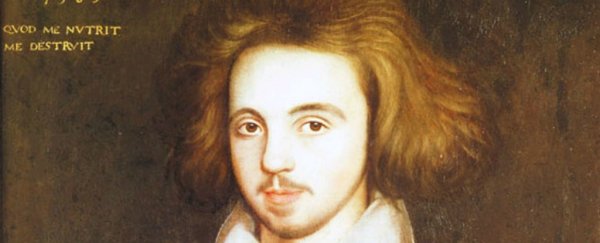Oxford University Press will soon publish a new critical edition of Shakespeare's completed works, The New Oxford Shakespeare, which will feature Christopher Marlowe as the Bard's co-writer on three Henry VI plays.
For decades now, researchers have been debating how much influence, if any, Marlowe had on Shakespeare's work. In fact, some have even claimed that the two writers were the same person.
But thanks to a culmination of mathematical analyses and hundreds of years of literary scholarship - including studies on Shakespeare's vocabulary, moral philosophies, and poetic style - an international group of researchers think they've finally put the mystery to bed once and for all.
"The orthodox view was that Shakespeare didn't collaborate at all. When the Oxford Shakespeare in 1986 proposed that eight plays of Shakespeare contained writing by other writers, some people were outraged," team member Gary Taylor from Florida State University told Dalya Alberge at The Guardian.
"What has happened since 1986 is that the accumulation of new scholarship, techniques and resources has made it clear that, in 1986, we underestimated the amount of Shakespeare's work that's collaborative."
In case you're unfamiliar with the scholarly debate that has entrenched Shakespeare and Marlowe for years now, here's a quick refresher.
Christopher Marlowe was one of Shakespeare's contemporaries, who was also respected a poet and playwright in the Elizabethan era. For years, researchers from many institutions made the connection that Marlowe and Shakespeare likely knew each other from working in the same field at the same time.
The extent of their relationship, though, has always been a point of contention. Some have suggested that Marlowe was one of the Shakespeare's biggest influences, and paved the way for many playwrights of the day with his use of blank verse.
Others have claimed that Marlowe might have actually been Shakespeare. This hypothesis stems from the fact that Marlowe died suddenly at the age of 29 in 1593, after being stabbed to death - possibly because he was entrenched in an espionage scandal. Yes, an espionage scandal.
Proponents of this hypothesis point to the fact that he was reportedly only born two months before Shakespeare, and the name Shakespeare only starts to appear in the literature about two weeks - give or take - after Marlowe's death.
The implication is that Marlowe was a real person, who faked his own death, and took on Shakespeare as a pseudonym.
But the biggest mark against this idea is the fact that Marlowe and Shakespeare wrote quite differently, using a different vocabulary and style throughout their works, which many researchers say is enough evidence to discount the notion that they were the same person.
Now, a joint team of 23 researchers from five different countries say that they've combined classic literary scholarship with big data to analyse every word in all of Shakespeare's texts, and compared them to those used in other plays and literature from the Elizabethan era.
This, they say, allowed them to find patterns that signify if one person wrote the entire work, or had the helping hand of a co-writer.
"Shakespeare has entered the world of big data and there are certain questions that we are now able to answer more confidently that people have been asking for a very long time," Taylor told Estelle Shirbon at Reuters.
The most significant find for the team was in the Henry VI series of plays, where they say that they've found evidence - which will be fully detailed in the upcoming issue of Shakespeare Quarterly - of Marlowe's hand, based on word use and mathematical patterns scattered throughout.
For example, the appearance and patterns of something the researchers call "Shakespeare-plus" words - like "beseech", "spoke", or "tonight" - that are scattered in many of his works are more like Marlowe's in sections. As Taylor explained to The Guardian:
"What we mean by Shakespeare-plus is that we've looked at the frequency of certain words which might seem commonplace like 'tonight' in all the plays of that early period, say up to 1600. Anybody could use any of these words. They're not words that Shakespeare invented. But we can say Shakespeare used 'tonight' much more often than other playwrights in those 20 years."
Using these specific words and word combinations, the team says they can accurately figure out who was writing what, finding that Marlowe's common words - like "glory droppeth" or "shape thou" - also appear in Shakespeare's works even though the Bard doesn't often use them.
But even with the mathematical evidence in their favour, many researchers still disagree that the two influential playwrights actually worked together.
Instead, some claim that it was likely Shakespeare starting his career at playhouses where Marlowe's work was already known by the actors that influenced the work.
"It's much more likely that he started his career working for a company where he was already an actor, and collaborated not with another playwright but with the actors - who will have had Marlowe very much in their heads, on the stage, in their voices," Shakespeare expert Carol Rutter from the University of Warwick in the UK, who was not a part of the new study, told NPR.
"They were the ones putting Marlowe's influence into the plays."
The New Oxford Shakespeare will hit shelves early next year.
